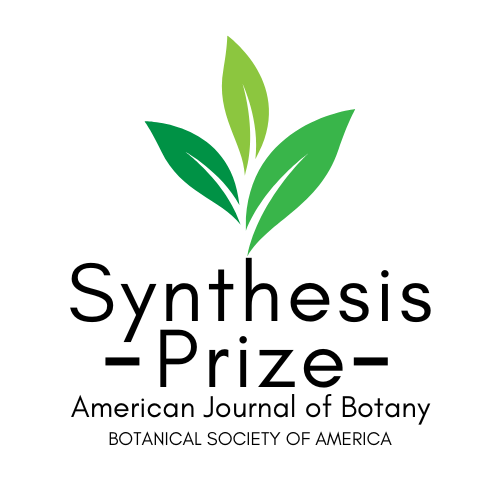|

2025 Call for Applications
AJB Synthesis papers and the AJB Synthesis Prize
The American Journal of Botany welcomes applications for our AJB Synthesis papers and the AJB Synthesis Prize to showcase early-career scientists.
The AJB Synthesis section features invited contributions by early-career scientists that concisely summarize and synthesize a focal research area or question. These articles summarize recent research and provide new insights that advance the field. Contributions focus on newly emerging areas or provide new perspectives on established areas. Authors are encouraged to express a personal perspective, while maintaining a balanced view of the field. Syntheses should be single-authored, no longer than 3,000 words, written so that they are accessible to the broad readership of the journal, and have informative and creative visuals. All Synthesis papers accepted for publication and published in fall 2025 through spring 2026 will be considered for the AJB Synthesis Prize.
Guidelines for AJB Synthesis Applicants:
- Applicants must be within six years of completing their PhD. Career breaks related to the pandemic or parental/dependent care are not included in the six-year time frame, but applicants should explain delays in the cover letter.
- The application should include: (1) a CV; (2) a one-page cover letter describing the applicant’s research interests, presenting a brief case for how they are equipped to write a synthesis on their topic, and explaining why their Synthesis topic is appropriate for AJB; (3) an abstract of 250-300 words; and (4) the name of a referee who could write a letter of support.
- Submit all materials as a single PDF to Amy McPherson at ajb@botany.org.
- Applications are due 17 February 2025.
Invitation for AJB Synthesis Authors:
- The selection committee will evaluate applications and choose 5-10 for letters of reference.
- The committee will then invite 3-6 applicants to write Synthesis papers to be submitted within six months.
- All submissions will be handled by AJB Associate Editors and go through peer review for publication.
Consideration for the AJB Synthesis Prize:
All Synthesis papers that are accepted for publication will be evaluated by a panel of judges, separate from the Synthesis Committee, and one paper will be selected for the AJB Synthesis prize. The author whose paper is selected will be awarded a $2,000 cash prize.
The Botanical Society of America and the American Journal of Botany are committed to inclusive science that reflects disciplinary, human, and geographic diversity. Submissions are welcomed from applicants of all ethnicities, races, colors, religions, sexes, sexual orientations, gender identities, socioeconomic status, national origins, disabilities, ages, or other individual status.
If you have any questions or comments, please contact Amy McPherson, BSA Director of Publications, at ajb@botany.org.
|